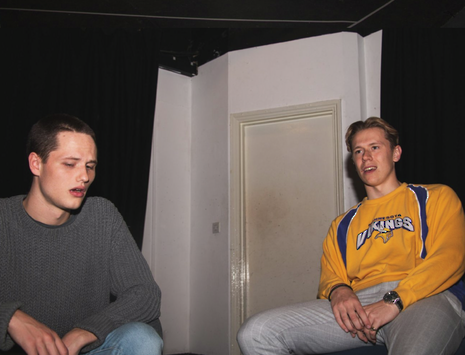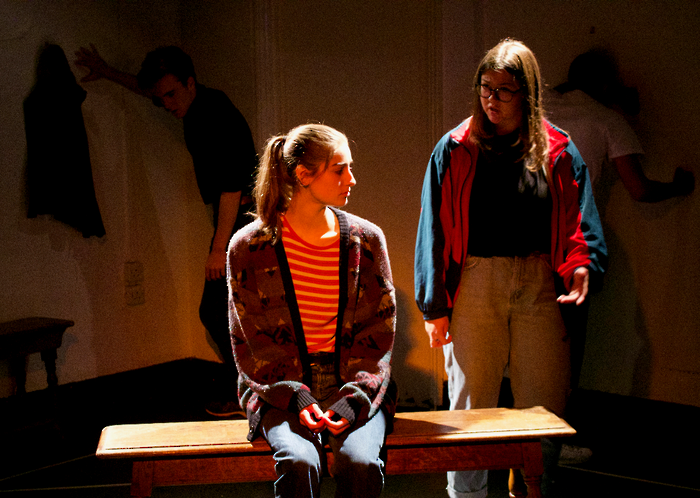Exploring male mental health in Big Boys Don’t Cry
Tom Foreman discusses the motives behind writing his new play, Big Boys Don’t Cry, and the importance of tackling issues of male mental health sensitively and accurately.

Content note: This article contains discussion of mental health and suicide.
I attended an all-boys school from the age of 10 until university. Coming to Cambridge was my first time removed from an almost entirely male environment in almost a decade. Going through adolescence in that atmosphere, I learnt a lot about the male mind and how we boys seem to cope when things aren’t going to plan; leaving that environment though helped me put it all into perspective.
The motives behind my play Big Boys Don’t Cry are numerous. I wanted to explore male adolescence on stage whilst also shedding light on the current crisis that is male mental health. Suicide remains the leading cause of death in males under 30. When I stopped to think about this statistic, it blew my mind. How is it that I am more likely, as a 20 year-old-male, to take my own life than to be killed by any accident, disease, or natural event? And why is this not being talked about more?
We see things in the press occasionally – recently the tragic passing of Love Island star Mike Thalassitis – and it sparks a discussion momentarily, but not for long. Within a few days other things fill the headlines, and male mental health becomes a smudge on our collective conscience; we know it’s there, we know it needs to be discussed, but we just can’t seem to find the words. The truth is it’s endemic, and the statistics show that.
“Suicide remains the leading cause of death in males under 30. When I stopped to think about this statistic, it blew my mind.”
With this in mind, I wanted to explore mental health but in an accurate, sensitive and realistic way. I absolutely abhor the current trend of sensationalising mental health problems for dramatic effect (13 Reasons Why) and so striking that tone right was of the upmost importance to me. The script has been reworked and modified more times than I can now count to ensure that every draft is better and more raw than the one before, and I have consulted numerous sources including the very kind people at Mind, the nationwide charity who do a wonderful job day to day for those in need.
But at the core of the play, it is still a simple story following the lives of two best friends growing up together. It’s nostalgic, it’s relatable, and at some points it’s hopefully even quite funny. The characters of Ben and Oscar represent everyone I have grown up with, every boy that has donned the stiff upper lip; unavoidably they represent me at points, and maybe if you are sitting in the audience, you may feel they represent parts of you too.
The script had progressed to a point where it meant so much to me that I could almost see every scene exactly as I wanted, and felt it needed, to be acted, so I made the challenging decision to fill the role of Ben. It’s been a rigorous, tiring process ensuring every scene is handled delicately and appropriately, whilst also trying to nail my performance. Fortunately I have been lucky enough to work alongside a fantastic director, Emily Webster, who shares my vision completely, and my co-star Will Leckie has been smashing every bit of dialogue he gets his hands on, which have helped to settle my nerves a bit.
Sitting here writing this, I cannot believe that Big Boys Don’t Cry is on so soon. After months of overthinking and redrafting, it’s about to be shared with the world (or, Cambridge at least). It’s been an incredible experience translating Big Boys Don’t Cry from paper to stage. It’s been a privilege working alongside our small team, and I’m so grateful to everyone involved for handling the script as well as they have. Please come along; I can’t wait to share these boys’ stories with you.
Big Boys Don't Cry will be showing at the Corpus Playroom at 9:30pm, Tuesday 5th to Saturday 9th November.
 News / Caius mourns its tree-mendous loss23 December 2025
News / Caius mourns its tree-mendous loss23 December 2025 News / Clare Hall spent over £500k opposing busway 24 December 2025
News / Clare Hall spent over £500k opposing busway 24 December 2025 Comment / The ‘class’ of Cambridge24 December 2025
Comment / The ‘class’ of Cambridge24 December 2025 Comment / Yes, I’m brown – but I have more important things to say22 December 2025
Comment / Yes, I’m brown – but I have more important things to say22 December 2025 Interviews / Politics, your own way: Tilly Middlehurst on speaking out21 December 2025
Interviews / Politics, your own way: Tilly Middlehurst on speaking out21 December 2025








